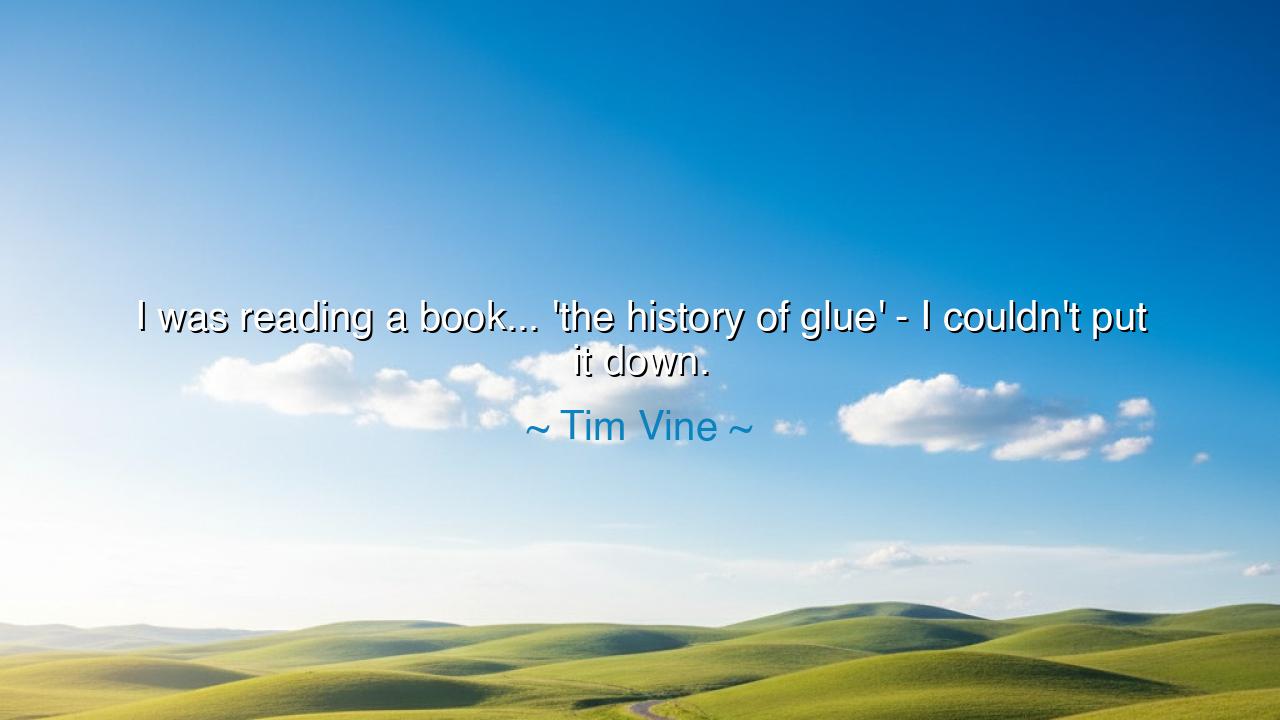
I was reading a book... 'the history of glue' - I couldn't put it






“I was reading a book... ‘the history of glue’—I couldn’t put it down.” So speaks Tim Vine, master of wit and wordplay, yet beneath this jest lies a reflection older than the jesters of ancient courts, older than laughter itself. For in this brief phrase—woven of humor, irony, and human truth—we find a mirror of the soul’s nature: that which binds us, and that which we cannot release. The ancients would have smiled at such a riddle, seeing in it the sacred paradox of attachment and fascination.
To “not be able to put something down” is, on its surface, a comic play on glue’s adhesive power. Yet beneath the laughter flows a deeper current. Is it not so that when the mind finds something that seizes its wonder, it clings to it as though bonded by invisible resin? Knowledge, love, beauty, and even folly—all these are the glues that hold our thoughts fast. Thus, Vine’s jest becomes wisdom: what binds us is not always physical, but emotional, intellectual, and spiritual.
In ancient Greece, the philosopher Socrates once spoke of the divine madness that takes hold of the soul when it encounters truth. When he heard a new idea that touched eternity, he could not let go—it possessed him, as surely as the reader in Vine’s jest is “stuck” to his book. In this way, the history of glue becomes a symbol for the lineage of human curiosity itself—the eternal urge to adhere to meaning, to hold fast to understanding until it becomes a part of us.
Consider, too, the story of Archimedes, that noble seeker of truth who leapt from his bath crying “Eureka!” when at last he grasped the secret of buoyancy. He, too, could not put his discovery down. The idea clung to him through steam and water, through madness and revelation. He ran naked through the streets of Syracuse, bound not by shame but by insight. So it is with all who discover something great—they are “glued” to it by the invisible bond of inspiration.
Yet beware, for what binds can also ensnare. There is a lesson here for the wise: do not let the wrong things stick. Many in history have been bound by greed, envy, or despair, and could not tear free. Like flies to amber, they mistook the golden shimmer of illusion for the warmth of truth. Therefore, learn to choose your adhesives wisely. Let your heart adhere to wisdom, your mind to discipline, and your spirit to compassion. Only such bonds will strengthen rather than imprison you.
In this way, Vine’s jest speaks also of liberation through understanding. The laughter it brings is the laughter of self-awareness—the moment when we see how deeply we cling, and yet can smile at our folly. To laugh is to loosen, and in that loosening, wisdom flows. Humor, then, is the gentle solvent of pride, freeing us from the stiffness of self-importance.
So, dear reader, when next you find something that holds your attention fast, ask yourself: What is it that binds me? Is it truth or vanity, love or fear? If it be noble, hold fast and let it shape you. But if it be hollow, warm your hands by the fire of laughter, and let it go. For life itself is a book of adhesions—some we must keep, some we must release.
Thus, the lesson endures: be mindful of what you cannot put down. Let your attachments serve your becoming, not your bondage. Seek to be glued only to what is good, kind, and enduring. In doing so, your spirit will not merely cling—it will connect.






AAdministratorAdministrator
Welcome, honored guests. Please leave a comment, we will respond soon